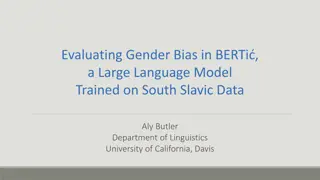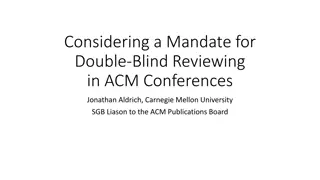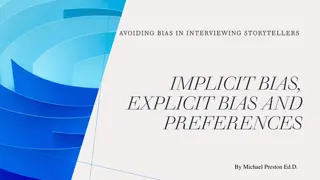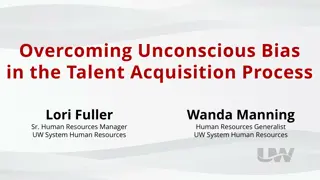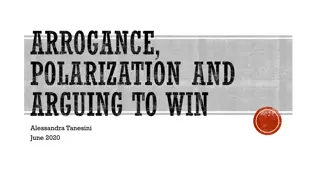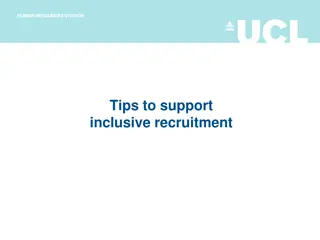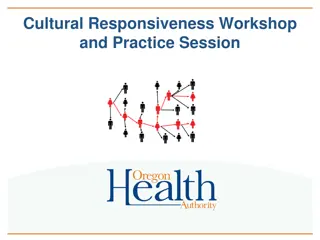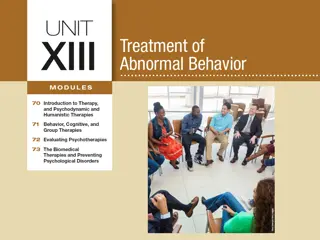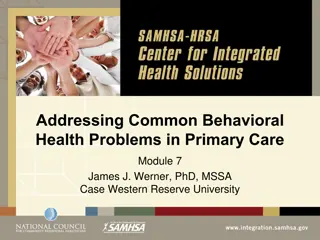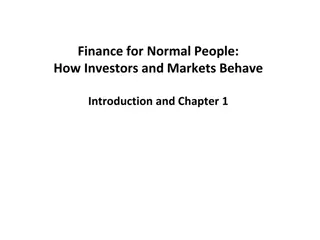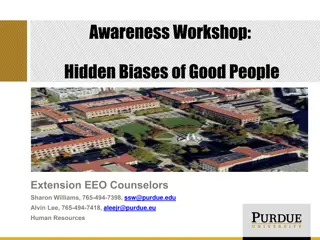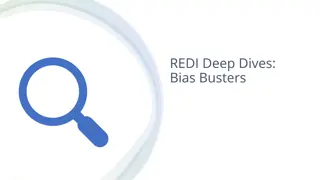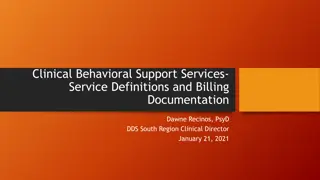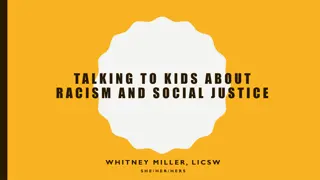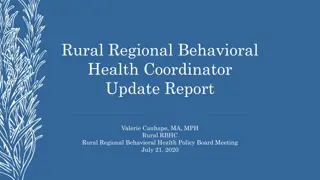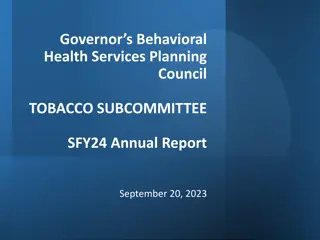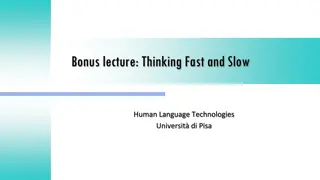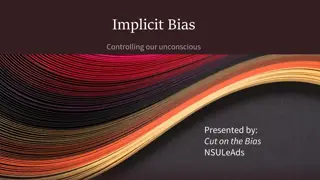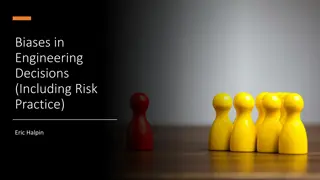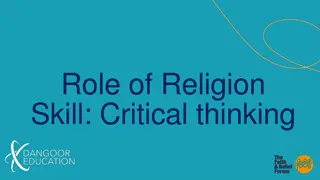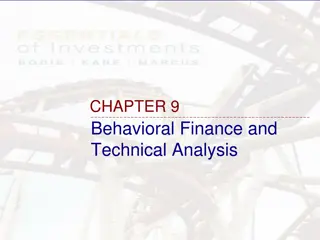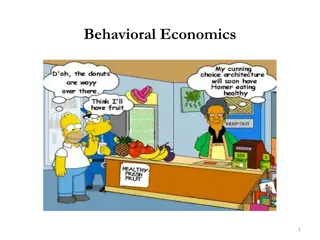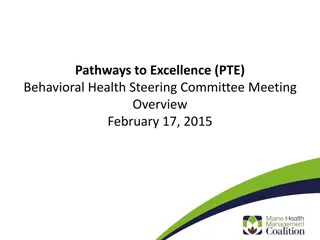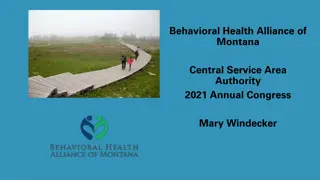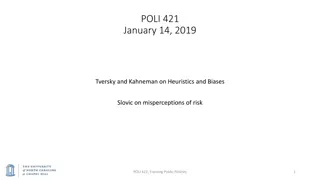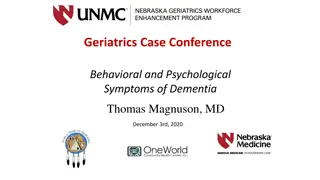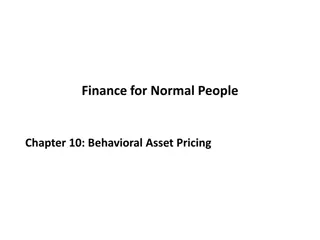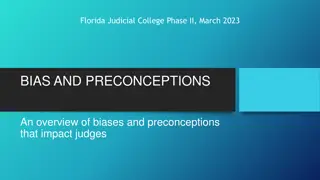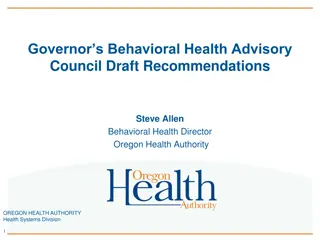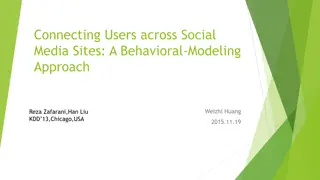Understanding Intersectionality in AI: Analyzing Biases in Generative Systems
Machine learning in AI can perpetuate biases related to race and gender. This workshop explores the concept of intersectionality to analyze how AI-generated avatars represent identities based on race, gender, and ethnicity. Participants will learn to recognize biases in generative AI and develop cri
4 views • 25 slides
Evaluating Gender Bias in BERTi: Insights on Large Language Models
This study delves into gender bias evaluation in BERTi, a large language model trained on South Slavic data. It explores issues in language modeling, the impact of social biases in artificial intelligence, and training processes of Large Language Models (LLMs). Additionally, it discusses how LLMs le
11 views • 16 slides
Recognizing Hidden Bias in the Workplace
In the workplace, hidden bias, also known as implicit bias, can significantly impact hiring, employment decisions, and overall workplace dynamics. Deloitte's 2019 State of Inclusion Survey revealed that a substantial percentage of workers experienced bias at least monthly. Hidden biases can be based
3 views • 18 slides
Understanding Hammurabi's Code: Rich vs. Poor, Men vs. Women, and Biases
Explore the ancient laws of Hammurabi's Code and their implications on social classes and gender roles. Uncover how the rich were treated differently from the poor and how men held greater rights than women under this legal system. Analyze the biases of Hammurabi, a wealthy king, and understand how
0 views • 12 slides
Understanding Artefacts and Biases in Gene Set Analysis
Gene set enrichment tests help identify functional gene sets enriched in hit lists compared to background sets. Various biases (technical, biological, statistical) can lead to incorrect conclusions in data analysis, emphasizing the importance of recognizing and addressing them. Technical biases like
0 views • 29 slides
Implementing Blind Evaluation Pilot in HORIZON EUROPE: Key Facts and Process
HORIZON EUROPE is conducting a pilot on Blind Evaluation in the 2023-2024 work program to address biases in the research and innovation evaluation process. The pilot aims to assess the feasibility of blind evaluations in ensuring fairness and mitigating potential biases towards well-known organizati
9 views • 9 slides
Enhancing Peer Review Quality Through Double-Blind Reviewing in ACM Conferences
Double-blind reviewing (DBR) is increasingly recognized for its effectiveness in reducing biases, improving article quality, and practicality in ACM conferences. Studies show evidence of gender and institutional biases in single-blind reviewing, while DBR enhances fairness and credibility. DBR revie
0 views • 9 slides
Understanding and Overcoming Bias in Interviewing
Bias in interviewing can arise from implicit and explicit prejudices, impacting perceptions and interactions with interviewees. Implicit biases are unconscious, while explicit biases are deliberate. Recognizing and addressing biases is essential to conduct fair and effective interviews. Examples ill
0 views • 17 slides
Overcoming Unconscious Bias in Talent Acquisition Process
Overcoming Unconscious Bias in Talent Acquisition Process emphasizes the importance of addressing unconscious bias in hiring practices through awareness and control. The content delves into defining unconscious bias, its impact on diversity, examples, and strategies for managing bias. The University
0 views • 19 slides
The Impact of Arrogance and Polarization on Group Deliberation
Individuals' biases and tendencies towards arrogance and overconfidence can hinder good group deliberation. The motivation to argue for learning, rather than winning, contributes to better group discussions. Understanding biases as features rather than bugs can lead to improved group judgment. Indiv
0 views • 19 slides
Effective Tips for Inclusive Recruitment Process
Effective inclusive recruitment requires avoiding biases, implementing positive action, using structured methods, fair short-listing, asking good interview questions, having model answers, and assessing candidates objectively. Overcoming biases and promoting diversity are essential to hiring the bes
0 views • 11 slides
Exploring Cultural Responsiveness Through Workshops & Practice Sessions
This content provides a comprehensive guide on cultural responsiveness through workshops and practice sessions. It covers topics like cultural sensitivity, biases identification, and ways to reduce implicit biases. Resources, videos, and insights on cultural knowledge and awareness are shared to pro
0 views • 19 slides
Evaluating the Effectiveness of Psychotherapy: Evidence and Critiques
Evidence suggests that psychotherapy works for many individuals, with high satisfaction rates reported. Critics, however, raise concerns about placebo effects, therapist biases, and human biases influencing perceptions of success. Clinicians acknowledge successful cases but remain cautious of cognit
0 views • 36 slides
Understanding Hammurabi's Code: Rich vs. Poor, Men vs. Women, and Biases
Explore the ancient laws of Hammurabi's Code and analyze how they differentiated punishments based on social status and gender. Learn about the biases of King Hammurabi and how they influenced the legal system he established in Mesopotamia. Delve into the historical context to understand the unequal
0 views • 12 slides
Behavioral Health in Primary Care: Understanding and Addressing Common Problems
Patients visiting primary care often present with physical symptoms that lack clear biological causes, indicating the importance of considering behavioral factors. Up to 70% of primary care visits are related to behavioral health needs, stressing the significance of addressing unhealthy lifestyle be
0 views • 40 slides
Unveiling Behavioral Economics for Actuarial Enhancement
Delve into the realm of behavioral economics to refine actuarial skills with insights from examples and thought-provoking scenarios. Explore cognitive biases, the Halo Effect, and probability paradoxes illustrated through engaging images and explanations drawn from Daniel Kahneman's book "Thinking,
0 views • 36 slides
Understanding Behavioral Finance in "Finance for Normal People
Delve into the world of behavioral finance as presented in "Finance for Normal People," exploring how investors and markets behave based on cognitive and emotional factors. The book covers topics such as cognitive shortcuts and errors, emotional biases, and correcting investment mistakes. It also di
0 views • 20 slides
Hidden Biases Awareness Workshop: Exploring Unconscious Prejudices
Delve into the complexities of hidden biases through an insightful workshop discussing stereotypes, microaggressions, and unconscious prejudice. This session aims to raise awareness, encourage dialogue, and provide resources for personal development in diversity and inclusion. Explore real-world exa
0 views • 12 slides
REDI Deep Dives: Bias Busters Activity
Engage your team in activities to uncover implicit biases and promote equity and inclusivity. This slideshow resource guides participants through reflection and discussions on bias impact on decision-making. Learn how to recognize and address biases within a group setting for a more resilient and in
0 views • 12 slides
Clinical Behavioral Support Services: Definitions and Guidelines
Clinical Behavioral Support Services are therapeutic interventions aimed at enhancing individuals' independence and community inclusion. These services involve creating positive behavioral support plans, assessing behavioral needs, providing appropriate training, evaluating plan effectiveness, and e
0 views • 11 slides
Talking to Kids About Racism and Social Justice with Whitney Miller, LICSW
Discussing racism and social justice with kids requires acknowledging inequities, understanding biases, creating safe spaces, storytelling to unlearn dominant narratives, exposing children to diverse content, and engaging in social justice activities as a family. Whitney Miller emphasizes the import
1 views • 7 slides
Rural Regional Behavioral Health Coordinator Update Report
Valerie Cauhape, MA, MPH, presents updates from the Rural Regional Behavioral Health Policy Board Meeting on July 21, 2020. The report highlights increased demand for behavioral health services, challenges in accessing inpatient providers, and initiatives for Behavioral Health Task Force implementat
1 views • 16 slides
Governor's Behavioral Health Services Planning Council Tobacco Subcommittee Report
Tobacco remains a significant risk factor for individuals with behavioral health conditions, with high smoking rates among this population. The Governor's Behavioral Health Services Planning Council Tobacco Subcommittee aims to promote a tobacco-free lifestyle and enhance recovery by addressing toba
0 views • 17 slides
Cognitive Biases and Decision Making: An Exploration of Human Psychology
Explore the fascinating realm of cognitive biases and decision-making through various mind-bending puzzles and scenarios. Dive into concepts such as fast and slow thinking, logical reasoning, and the impact of biases on our everyday choices. Challenge your cognitive reflection with intriguing questi
0 views • 14 slides
Understanding Implicit Bias and Overcoming Negative Biases
Implicit bias influences attitudes and behaviors unconsciously. Learn about its key characteristics, testing methods like the Implicit Association Test, and how to combat negative biases through mindfulness techniques. Explore real-world examples and strategies to address biases effectively.
0 views • 19 slides
Managing Biases in Engineering Decisions - Strategies and Tools
Dive into the complexities of biases in engineering decisions, particularly in risk assessment, and explore ways to identify, understand, and manage biases effectively. Discover insightful strategies, responsibilities, and tools to mitigate biases and enhance decision-making processes in engineering
0 views • 11 slides
Enhancing Critical Thinking Through Examining the Role of Religion
Explore the role of religion in developing critical thinking skills by identifying biases, critically evaluating information sources, and fostering nuanced perspectives. Reflect on personal biases, sources of information, and engagement with controversial issues. Enhance critical thinking by analyzi
0 views • 12 slides
Enhancing Engagement and Addressing Biases in Family-Centered Support
Explore the significance of active listening, engagement, and combating biases in supporting families within the child welfare system. Learn about the importance of involving parents and caregivers, understanding biases, and implementing strategies to reduce implicit bias. Emphasizing family voices
1 views • 18 slides
Understanding Behavioral Finance and Technical Analysis
Behavioral finance explores irrational behaviors in decision-making processes in finance, highlighting the limitations of rationality assumptions. It delves into information processing problems and behavioral biases that can distort market prices. The consistency between technical analysis and behav
0 views • 43 slides
Understanding Behavioral Economics and Decision Making
Behavioral economics challenges the traditional rational agent model by incorporating insights from psychology into economic behavior analysis. This approach reveals systematic biases and departures from rational decision-making, leading to a better understanding of why people make certain choices.
0 views • 16 slides
Pathways to Excellence Behavioral Health Steering Committee Meeting Overview
The Pathways to Excellence (PTE) Behavioral Health Steering Committee Meeting held on February 17, 2015, reviewed the roles of various organizations, discussed the steering committee membership, and established domains of quality in behavioral health. The meeting focused on reporting meaningful beha
0 views • 16 slides
Behavioral Health Alliance of Montana: Advocating for Behavioral Health Providers and Clients
Formed in 2017 by the Montana Healthcare Foundation, the Behavioral Health Alliance of Montana serves as a unified voice for advocacy on behalf of behavioral health providers and clients in the Central Service Area Authority. With a focus on supporting adult and children's mental health, substance u
0 views • 18 slides
Understanding Cognitive Biases in Decision Making
Explore Tversky and Kahneman's research on heuristics and biases, Slovic's insights on risk misperceptions, and the implications of cognitive biases in decision-making processes. Delve into topics such as representativeness, availability bias, anchoring, and Prospect Theory by Kahneman and Tversky.
0 views • 12 slides
Integrated Behavioral Health Initiative for PHN Practices
The Behavioral Health Initiative (BHI) aims to develop a comprehensive strategy to address mental and behavioral health needs in the PHN regional practice network. It offers training, education, and partnership opportunities for PHN members, including free webinars, office hours, and a yearlong Qual
0 views • 4 slides
Understanding Behavioral Symptoms of Dementia in Geriatric Patients
This informational content discusses the various behavioral and psychological symptoms of dementia (BPSD) in geriatric patients, including common symptoms like depression, aggression, anxiety, and apathy. It highlights the prevalence of behavioral issues in dementia patients, their impact on caregiv
0 views • 15 slides
Understanding Behavioral Asset Pricing: Factors Influencing Price and Return Expectations
Behavioral asset pricing models link investment asset returns with various factors such as risk, liquidity, and cognitive biases. This chapter delves into how features and characteristics influence the pricing of assets like cars and stocks, exploring the utilitarian, expressive, and emotional benef
0 views • 46 slides
Understanding Biases and Preconceptions in Judicial Decision-Making
Explore the impact of biases and preconceptions on judges, including definitions of bias, prejudice, and implicit bias. Learn how past experiences can influence judicial duties and the importance of judges being aware of their perspectives. Discover exercises to identify biases and potential issues
0 views • 12 slides
Unpacking Biases and Tackling ISMs in Life
We all carry biases and opinions that influence our decisions. Learning to separate bias from stereotype is crucial for making informed choices. This course delves into identifying and addressing biases to combat ageism, sexism, racism, classism, and homophobia in society.
0 views • 10 slides
Oregon Health Authority's Behavioral Health Advisory Council Recommendations
Oregon Health Authority's Behavioral Health Advisory Council (GBHAC) is focused on improving access to effective behavioral health services for adults and transitional-aged youth with mental illness and substance use disorders. The council's recommendations aim to advance health equity, early detect
0 views • 17 slides
Behavioral Modeling Approach Across Social Media Sites
This paper explores a behavioral modeling approach for connecting users across social media sites, aiming to identify individuals based on their shared information and unique behavioral patterns. It addresses the importance of verifying ages online and presents a methodology called MOBIUS for user i
0 views • 29 slides

